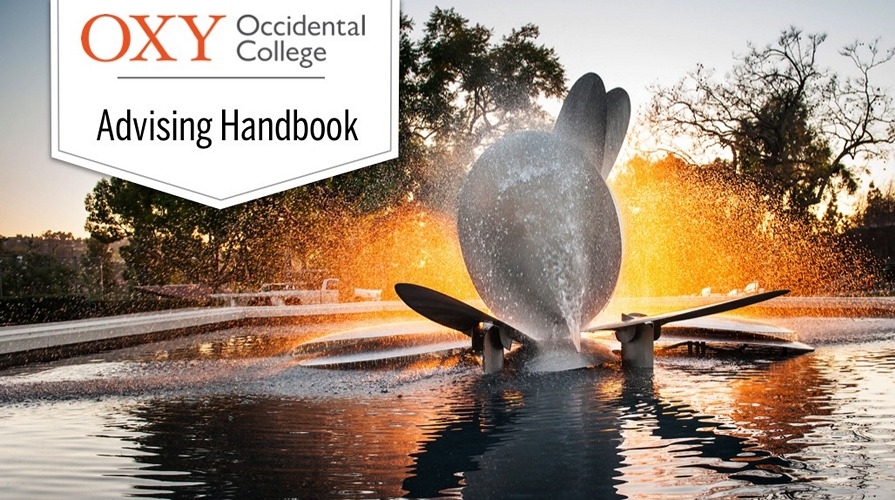Academic Resources
Advising Center
Location: Johnson Student Center 134
Phone: 323-259-1341
Email: advisingcenter@oxy.edu
While faculty advisors are the primary source of academic advising at Occidental, the Advising Center is an additional resource for students on routine academic matters, including questions about academic policies and procedures, tracking Core Requirements, placement exams, transferring credit from other institutions, and so on. Advising Center advisors also frequently meet with students who are undecided about a major or minor and wish to discuss the various options, and it’s a good first stop for students who aren't sure which office or faculty member to talk to regarding a specific program or objective.
Visit the Advising Center web page for the current hours and other helpful information!
Return to top ↑
Pre-health Advising
Location: Hameetman Career Center
Director: Kat Wang (prehealthadvising@oxy.edu)
Phone: 323-259-2665
Webpage: Pre-Health Advising
The Office of Pre-Health Advising (OPHA) at Occidental College provides information, resources, and in-depth advisement to students and alumni who are interested in matriculating to professional graduate programs in various health professions. To receive regular updates on pre-health events and opportunities, students can sign up for the Pre-Health Digest by though the link on the Pre-Health Advising page.
Return to top ↑
Pre-law Advising
Pre-Law advising is provided by Professor Marisol Leon.
Return to top ↑
The Library (at the Academic Commons) is the place where expertise and resources—human, print, electronic, spatial, and technological—come together. It is a primary node in Oxy's intellectual network, staffed by research/resource savvy professionals.
Return to top ↑
Location: Hameetman Career Center
Director: Jennifer Locke (jlocke@oxy.edu)
Phone: 323-259-2742
The National and International Fellowships Office provides individualized advising appointments for students and alumni to help them identify sources of external funding (through foundations, governments, organizations) relevant to their short and long-term interests and goals. The office also works closely with students on their application materials and proposals, provides interview preparation, and conducts mock interviews for the fellowships that require them.
Fellowship opportunities exist for first years, sophomores, juniors, seniors, and alumni. Fellowships fund a wide variety of activities: language learning, independent research, leadership training, research assistant opportunities, academic experiences, study abroad, graduate training/programs/school, professional development/work experiences, teaching English, and public service opportunities. While some programs require a high GPA, many others value effective leadership and involvement as much as or more so than grades.
Return to top ↑
Peer Learning (Tutoring)
Location: Academic Commons and Johnson Hall
Occidental offers support for most subjects through our peer advising (tutoring) programs. The Subject Advisers are available in the Academic Commons on the ground floor for all academic disciplines offered at Oxy and Language Advisers are available in Johnson Hall for all languages taught at Oxy.
Return to top ↑
Location: Academic Commons (Ground Floor)
Director: Prof. Julie Prebel ( jprebel@oxy.edu )
The Writing Center offers students from all disciplines two types of support to work on their writing: peer-to-peer, drop-in consultations with knowledgeable Writing Advisers and appointments with Faculty Writing Specialists from the Writing and Rhetoric department. For more information, visit the Writing Center webpage.
Return to top ↑
Academic Mastery Program
The Academic Mastery Program (AMP) provides challenging workshops for students enrolled in general chemistry, organic chemistry, introductory physics, cellular and molecular biology, and basic calculus courses. These workshops are led by upper-level students and provide an opportunity to test knowledge and skills in the context of new and challenging problems. The workshops provide a time to work intensively and collaboratively with other committed students in an atmosphere that is demanding yet relaxed. Information about these workshops is provided in the relevant courses at the beginning of each semester.
Return to top ↑
Contact: ssap@oxy.edu
The mission of the Scientific Scholars Achievement Program (SSAP) is to support the development of a diverse body of individuals who will advance and enhance STEM (Science, Technology, Engineering, and Math) professional fields in an endeavor to meet the complex and evolving demands of a culturally heterogeneous society.
SSAP provides tutoring in introductory and gateway STEM courses and encourages collaboration among classmates. All questions and learning styles from students are welcomed and encouraged in our program. Through educational and social events, SSAP aims to build community between faculty and students studying math and science at Occidental.
Return to top ↑

